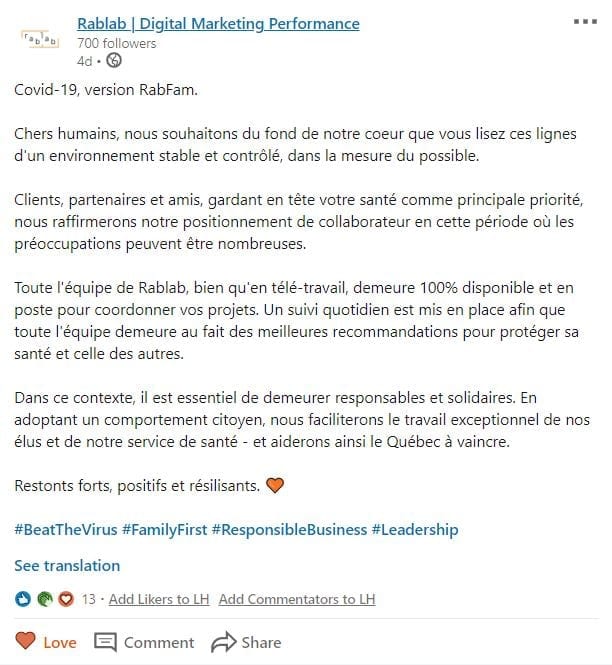Bill Gates predicted it in 2015 at a spirited TED Talk in Vancouver: the next major global threat was the possibility of a deadly virus spreading rapidly. Just five years later, here we are—individuals and businesses have seen this prediction become the unfortunate reality. Things are crazy at every level, and the digital world is no exception. How should businesses rethink their digital marketing strategy during this coronavirus (COVID-19) crisis?

Knowing you have many questions, we decided to lay out a simple action plan for Quebec businesses based on the outlook of three of our digital experts.
Face the facts
Of course, our first thoughts go to our families and our health. But our society depends on a stable economy, and the current uncertainty is turning a lot of things upside down. Most B2B companies have seen their operations slow down considerably, almost all retail businesses are closing, and many SMEs are being forced to lay off employees to survive.
However, a large number of SMEs are now able to generate income only through digital means—for example, requests made through forms (B2B) and online sales (e-commerce). It stands to reason that cutting off online investments would be counterproductive for this type of business.
Your digital strategy needs a game plan
Communication and content
The first aspect to focus on is your customers. They’re the reason your business exists. Keep them informed! Sometimes, just a post on your social media channels (Facebook, Instagram, LinkedIn) can be enough to show your social responsibility and create goodwill. As for content, think of the content on your website, the copy written for your advertising platforms and the tone you use in your email or newsletter communications, for example.

Here’s a tip: find inspiration by subscribing to the pages and newsletters of companies whose communications you admire! We have to admit we currently have a soft spot for the newsletter strategy Dans le sac is using.
Digital investments
Your industry and business model will have a big impact on the way your investments should fluctuate. This may seem like Marketing 101, but it’s essential to reiterate.
Before drawing up your game plan, take a moment to ask yourself about the search and consumption habits of your current and potential customers.
Is it a good idea to try to reach both groups at once?
Should you focus all your efforts on your current customers to increase their loyalty and build goodwill?
Is your data showing you that certain products or services are trending?
Answering these questions will be a great help for reviewing your budgets.
Since organic traffic is declining for several industries, implementing a web marketing strategy is a must to secure revenue.
Another handy tip: set aside some time to pore over your customer data (CRM, CMS, Google Analytics), Google Trends and your industry’s macro data.
Tactics: advice from our experts

Jérémy Rochefort
Team leader (social media marketing and email marketing)
Q: Jey, what should a marketing manager be prioritizing on social media right now?
A: In my opinion, the key is to stay relevant and to be seen. Any business can be relevant to a given target audience—you just have to take the time to design the right content and approaches. As for being seen, I think advertisers have a golden opportunity right now.
Q: In light of your expertise, what tactical advice would you give Quebec companies?
A: Here’s a rapid-fire summary of the advice I give my clients:
1- Think twice before putting everything on hold. Digital is sometimes the only realistic source of revenue.
2- Adapt your communication strategy. Have a message that’s consistent with the situation and avoid raising controversy. Make sure you’re not sending mixed messages. Choose your words and phrasing carefully given the ongoing crisis, and don’t be blatantly opportunistic.
3- Apply an organic content strategy which will then be supported and amplified by your campaigns.
4- Implement a newsletter content strategy.
5- Your goal isn’t to encourage people to consume more, but rather to consume better and for the right reasons (for example, to encourage our local economy).
6- Facebook/Instagram Ads: media costs (CPM) have gone way down, with several companies putting the brakes on their campaigns, creating a golden opportunity for those ready to seize it. Naturally, time spent on social media in times of crisis is ballooning. Therefore, your content should be tailored to the situation and, if possible, include an incentive in order to stand out, incite audiences to action and generate conversions.
7- Newsletter and email marketing: your email subscriber list is an acquired medium (you no longer need to pay to reach these people). For many businesses, this is a great opportunity to create relevant content and increase the frequency of newsletter mailings to keep your community engaged. Just keep the current context in mind and remain sensitive in your approach. In addition, you can implement some handy automations to optimize your online sales funnel.
8- More than ever, now is the time to engage with your audiences—and quickly! (whether it’s through comments, online chat, emails, phone calls, online forms, etc.)
9- Incentives: your customers will have plenty of time to draw comparisons. Be generous by offering a discount or an incentive such as free shipping.

Jimmy Lavallée-Carignan
Team leader (search engine marketing and programmatic advertising)
Q: Jimmy, what can you tell us about the current behaviour of Internet users?
A: The bottom line is that virtually all industries are being negatively impacted at this early stage of the crisis (except for food markets in the short term). This trend is likely to be reversed in the coming weeks as people will still need and want to consume certain products. We’ll be witnessing a spike in search volumes for some sectors.
Q: In light of your expertise, what tactical advice would you give Quebec companies?
A: These are the key points I tend to go over with my clients:
1- As my colleague Jérémy was saying, consider your options carefully before you shut everything down. I would even add that it’s advisable, when possible, to keep some investment going to avoid negatively impacting Google’s algorithm.
2- Here, again, your advertising content will have to be reviewed (key messages, tone, ad extensions, incentives).
3- Always keep analyzing the market’s reaction—search volumes, competitiveness and purchasing behaviour observed on your website—so you can do a quick course correction if necessary.
4- Like social media use, online searches will tend to increase in several industries the longer the crisis goes on. A smart move would be to keep your investments going for some keywords that are relevant during this crisis. For example, Gorila Fitness has seen a huge spike in demand for its home fitness products, leading to a great investment opportunity. Keeping your finger on the pulse of search volumes and competitiveness can be more complex, so don’t hesitate to call on a trusted web marketing expert.

Roland Mérelle
Team leader (search engine optimization)
Q: Roland, how do you view search engine optimization’s role during a crisis?
A: As long as the coronavirus is a threat, the B2C customer will be less likely to go out to stores. They’ll spend more time online and consume more digital content. Therefore, a business that boasts relevant digital content is more likely to see an uptick in its organic traffic. On the B2B side, more time at home means that a client or prospect will be less busy with meetings, coffee breaks and travel. That’s another thing to capitalize on to improve your content strategy.
Q: In light of your expertise, what tactical advice would you give Quebec companies?
A: There are a few things that come up in most cases:
1- Despite what most people might think, this crisis can be the perfect opportunity to take some time to review your business’s long-term content strategy and optimize your website. The crisis will end eventually, and proper planning will give you a competitive edge when the recovery comes (and it’s likely to be a very strong recovery, by the way). If you feel it could help, why not have a free SEO audit performed here?
2- Internet users have more time to compare offers, which is why you should make sure to update your digital platforms (social media accounts, Google My Business profile, website) and product availability on your e-commerce sites, create more blog posts and even, if time permits, make a FAQ section for your website.
3- Tips for B2B companies: improve your website’s “Services” page. Do you have a white paper lying around? Publish it online. These moves will pay off in the medium term, when the economy is expected to recover. Say your business model no longer requires the usual investments in search engine management—that’s great! Use the freed-up budget to work on your organic content instead.
4- Internet users (nearly) always favour organic results, especially when they have time to compare what’s on offer. With better-targeted traffic and an improved user experience, you’ll be boosting your visibility in the medium and long term.
After the crisis
Keep in mind that this rough situation will eventually pass. It can take a long time for a business to design a good marketing plan that combines relevant content with an effective media strategy—it’d be a shame to waste all these efforts by shutting down your communication and marketing actions and processes.
As much as possible, view this context as a chance to strengthen your marketing tools. This will give you a leg up on your competition when economic recovery begins. Conversely, sticking to the status quo could lead to a drop in performance over several months. Ultimately, this will lead to more jobs in web marketing
The golden age of drop shippers and opportunistic companies is behind us. People want something authentic, something real. By weathering the crisis alongside your customers, you’ll be proving your worth to them, and they’re sure to show their gratitude in the short, medium and long term!
What about Rablab? How are we coping with the crisis?
Our industry certainly hasn’t been spared. Most service companies are experiencing a significant slowdown in their activities, and we’re no exception.
We made the joint decision to set aside our short-term objectives in order to refocus on the essentials: our people, our process and our clients. We’re working together (albeit from home!) to improve our knowledge and approaches for the benefit of our clients in order to reaffirm our position in the market as a top-tier digital partner.

With or without a crisis going on, the Rabfam will always work with rigour, expertise and a collaborative spirit to achieve the digital objectives of our clients.
Let’s stay positive!
– Maxime

